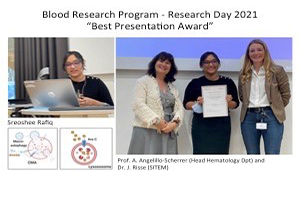Best presentation award, Blood Research Program, Research Day, 2021

Research Day, "Blood Research Program", November 2021
Sreoshee Rafiq received the best presentation award for her talk entitled "Chaperone-mediated autophagy regulation during acute promyelocytic leukemia differentiation". Her work describes that increased activity of chaperone-mediated autophagy (CMA), a subtype of autophagy, has a negative impact on differentiation therapy in acute myeloid leukemia cells.